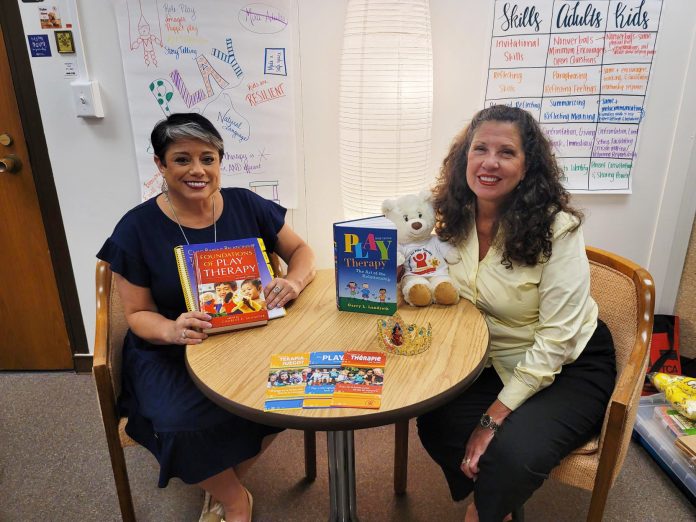
University of Texas Permian Basin’s Counseling Department is offering a play therapy certificate that began this fall.
UTPB Assistant Professor of Counseling Cynthia Anderson said the fall semester is for play therapy basics with advanced play therapy being offered in the spring. Sand tray is provided in the summer.
For children, Anderson said, their language is play and toys are their words.
“You can build rapport playing with them and then they work through their issues and find great comfort in that,” she added.
Play therapy is Anderson’s passion.
“I specialized in play therapy when I went to school at St. Mary’s University in San Antonio. Even prior to that, I used play therapy in the schools for 17 years and have my own private practice in play therapy in Bandera.”
She got her doctorate in counselor education and supervision, so when she was hired at UTPB, Anderson brought the play therapy specialization with her.
She also has a bachelor’s degree from Texas State University and a master’s from University of Houston-Victoria. In 2022, she earned the prestigious Registered Play Therapist Supervisor credential conferred by the Association for Play Therapy.
Her research centers primarily around advocating for child and adolescent counseling needs through play therapy and training future counselors to meet those needs, the UTPB website says.
“Everything that I write and publish is along that vein. It’s my passion. It’s what I feel like I’m put on this earth to do and make a difference in the world and help children. When you look at the statistics, especially in the state of Texas, children who have a mental health diagnosis, 50-70 percent … do not receive any kind of mental health services. There are some deficits and one of the issues is that many counselors are not trained in how to work with children,” Anderson said.
When students learn play therapy methods at the university level, they have greater knowledge about helping children.
“I’m wanting to spread that message so that our counselors are educated and can provide the best services for this community,” Anderson added.
She said it should take a full year to earn the play therapy certificate.
“Most of our students have the child and adolescent counseling course already and then they can take play therapy basics in the fall and then advanced play therapy in the spring … The sand tray is offered in the summer. The sand tray is going to be a hybrid course where they take most of the academic preparation online and then the last three weeks we’ll have an experiential sand tray,” Anderson said.
The sand tray is literally a large tray filled with sand. The client places miniatures in it and that expresses what comes out of the subconscious, she said.
“It’s really amazing and phenomenal the work that comes out of sand tray,” Anderson said.
The basic class is the foundation where students get the foundation of history, theories, methods, skills, social and cultural factors.
The second part in the spring is advanced play therapy, which will involve working with children using more hands-on active learning.
“I’m working on a collaboration with High Sky Children’s Ranch. They have a beautiful facility. They have craft rooms and then they have all the different play rooms and sand tray with observation areas,” Anderson said.
Part of the goal is to have advanced play therapy students interact with children by making puppets, masks and doing other crafts to get comfortable with them.
“Another activity will be for them to … do a short play therapy session with a child. Then one of the other students in the class can be a peer evaluator because High Sky has those observation rooms. It’s just ideal for us to collaborate with them,” Anderson said.
At the moment, the play therapy certificate is for UTPB students in graduate studies for counseling.
“But this next fall cohort, we’re opening it up to the community so any counselor in the mental health field — they can be an LMFT (Licensed Marriage and Family Therapist), a social worker, a psychologist, a counselor — they are able to get the certificate, too,” she said.
“They have to go to our graduate studies and under Apply Texas and it will be a non-degree seeking certificate. But the value in that is that those are the hours needed to eventually become a registered play therapist. The registered play therapist credential comes from APT, the Association for Play Therapy. It’s under their auspices,” Anderson added.
She presented to Ector County ISD counselors and got a list of people interested in the play therapy certificate.
“We’re thinking that these are many of the people that are going to be registering and signing up from the community. I’m also going to present at PBCA, the Permian Basin Counseling Association, and introducing the play therapy certificate to them so that we can serve the community and our students and get as many play therapists out there as we can so we can serve those children,” Anderson said.
Anderson, Maria Avalos, associate professor and Department Chair, and Priscilla Reyna-Vasquez, visiting professor at St. Mary’s, have a research project where they are collecting data from licensed professional counselors across Texas to see what kind of training they received when they were in their graduate programs in counseling and if they learned how to counsel children or not.
“We’ll see what comes out of that research, but likely the hypothesis is that they’re not receiving that education and therefore they’re not able to provide … those services. We’re trying to make a difference in the world,” Anderson said.



